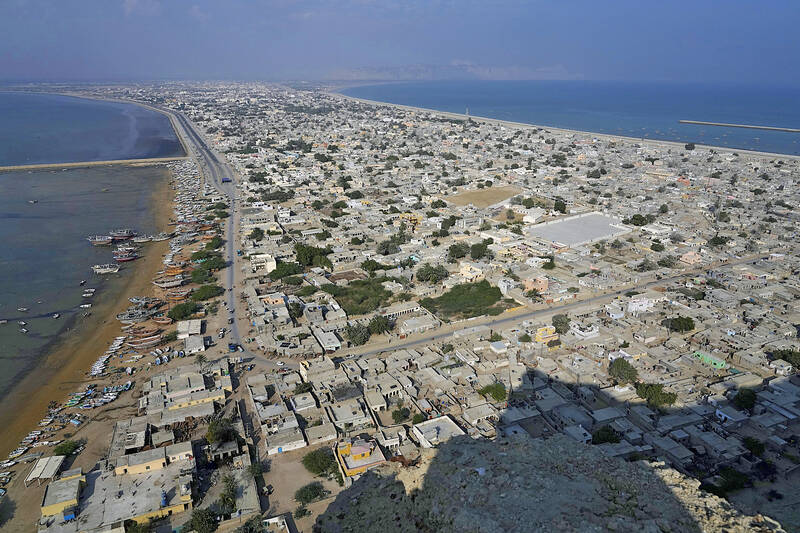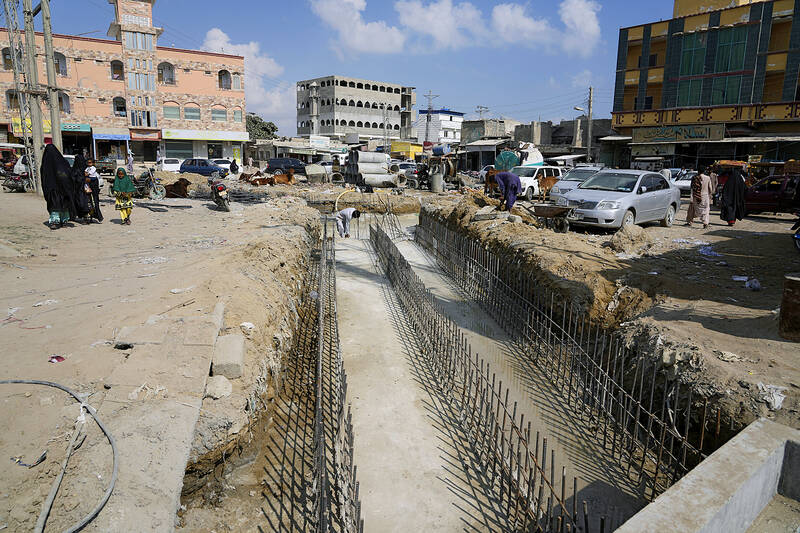There was a time when few people in the coastal Pakistani city of Gwadar understood what climate change was. After a decade of extreme weather, many more do.
Rain battered Gwadar for almost 30 consecutive hours in February last year. Torrents washed out roads, bridges and lines of communication, briefly cutting the peninsula town off from the rest of Pakistan. Homes look like bombs have struck them and drivers swerve to avoid craters where asphalt used to be.
Gwadar is in Balochistan, an arid, mountainous and vast province in Pakistan’s southwest that has searing summers and harsh winters.

Photo: AP
The city, with about 90,000 people, is built on sand dunes and bordered by the Arabian Sea on three sides, at a low elevation that makes it vulnerable to climate change in a country that has already seen its share of catastrophe from it.
“It’s no less than an island nation situation,” Gwadar-based hydrologist Pazeer Ahmed said. “Many low-lying areas in the town will be partially or completely submerged if the sea level continues to rise.”
The sea, once a blessing for Gwadar’s fishing and domestic tourism sectors, has become an existential threat to lives and livelihoods.

Photo: AP
Warming oceans mean bigger and more powerful waves, and those waves get whipped higher by summer monsoon winds. Warmer air holds more moisture — about 7 percent more per degree Celsius — and that means more big rain events.
“Waves have become more violent due to the rising sea temperatures and eroded beaches,” Gwadar Development Authority deputy environment director Abdul Rahim said. “The tidal actions and patterns have changed. Hundreds of homes have been washed away. It is very alarming.”
Melting glaciers contribute to rising sea levels, another cause of coastal erosion. The sea level at Karachi rose almost 20cm between 1916 and 2016, according to data from the US’ National Oceanic and Atmospheric Administration. It is projected to rise another 1.3cm by 2040.
In areas near Gwadar, such as Pishukan and Ganz, waves have swallowed up mosques, schools and settlements. There are gashes in the cliffs at the popular picnic spot of Sunset Park, and rocks have cascaded onto the shore. Beaches run flat for dozens of kilometers because no structures remain on them.
Authorities have built seawalls from stone or concrete to hold back saltwater intrusion, but they are a small solution to a massive problem as Gwadar’s people and businesses are fighting climate change on different fronts.
Saltwater pools on government land, salt crystals glistening in the sunshine. In the Shado Band neighborhood, former local councilor Qadir Baksh fretted about water seeping up through the ground and into his courtyard every day, held at bay only by regular pumping. Dozens of houses have the same problem, he said.
Officials, including Ahmed and Rahim, said changes in land use and unauthorized building are worsening flooding. Locals said some major construction projects have destroyed traditional drainage pathways.
CHINA
Gwadar is the centerpiece of a massive Chinese-led initiative to create an overland route between its western Xinjiang Province and the Arabian Sea through Gwadar. Hundreds of millions of dollars have poured into the town to create a deep seaport, an international airport, expressways and other infrastructure. The more sensitive projects, especially the port, are tightly secured by the Pakistani military, out of sight and off-limits to the public.
However, there is no proper sewage or drainage system for residents despite a decade of foreign investment, and Gwadar’s porosity, high water table, rising sea levels and heavier rainfall are rocket fuel for the town’s vulnerability.
“In the past when it rained, the water disappeared up to 10 days later,” Baksh said. “But the rain that came last year hasn’t gone. The water rises from the ground with such speed it will reach the four walls of my home if we don’t run the generator every day to extract it. Officials say it’s because of climate change, but whatever it is, we’re suffering.”
FISHING
Gwadar’s fishing community is also hurting. Catches are smaller, native fish are disappearing, and migration patterns and fishing seasons have changed, Ahmed and Rahim said. There is also algae bloom and the invasion of unwanted marine species like pufferfish.
Illegal fishing and foreign trawlers are responsible for a few of these things, but it is mostly rising sea temperatures.
People have migrated from places like Dasht and Kulanch because of water scarcity. What agriculture there was in Gwadar’s surrounding areas is vanishing due to loss of farmland and livestock deaths, locals said.
It is part of a wider pattern in which Pakistan’s farmers are seeing declining crop yields and increasing crop diseases due to climate extremes, particularly floods, droughts and heat waves, the UN’s Intergovernmental Panel on Climate Change has said.
“There are heat waves and dust storms in Gwadar,” Ahmed said. “But the main impact of climate change here is that there is too much water and not enough of it. If nothing is done to address this problem, we will have no option but to retreat.”

VAGUE: The criteria of the amnesty remain unclear, but it would cover political violence from 1999 to today, and those convicted of murder or drug trafficking would not qualify Venezuelan Acting President Delcy Rodriguez on Friday announced an amnesty bill that could lead to the release of hundreds of prisoners, including opposition leaders, journalists and human rights activists detained for political reasons. The measure had long been sought by the US-backed opposition. It is the latest concession Rodriguez has made since taking the reins of the country on Jan. 3 after the brazen seizure of then-Venezuelan president Nicolas Maduro. Rodriguez told a gathering of justices, magistrates, ministers, military brass and other government leaders that the ruling party-controlled Venezuelan National Assembly would take up the bill with urgency. Rodriguez also announced the shutdown

Chinese President Xi Jinping’s (習近平) purge of his most senior general is driven by his effort to both secure “total control” of his military and root out corruption, US Ambassador to China David Perdue said told Bloomberg Television yesterday. The probe into Zhang Youxia (張又俠), Xi’s second-in-command, announced over the weekend, is a “major development,” Perdue said, citing the family connections the vice chair of China’s apex military commission has with Xi. Chinese authorities said Zhang was being investigated for suspected serious discipline and law violations, without disclosing further details. “I take him at his word that there’s a corruption effort under

China executed 11 people linked to Myanmar criminal gangs, including “key members” of telecom scam operations, state media reported yesterday, as Beijing toughens its response to the sprawling, transnational industry. Fraud compounds where scammers lure Internet users into fake romantic relationships and cryptocurrency investments have flourished across Southeast Asia, including in Myanmar. Initially largely targeting Chinese speakers, the criminal groups behind the compounds have expanded operations into multiple languages to steal from victims around the world. Those conducting the scams are sometimes willing con artists, and other times trafficked foreign nationals forced to work. In the past few years, Beijing has stepped up cooperation

Exiled Tibetans began a unique global election yesterday for a government representing a homeland many have never seen, as part of a democratic exercise voters say carries great weight. From red-robed Buddhist monks in the snowy Himalayas, to political exiles in megacities across South Asia, to refugees in Australia, Europe and North America, voting takes place in 27 countries — but not China. “Elections ... show that the struggle for Tibet’s freedom and independence continues from generation to generation,” said candidate Gyaltsen Chokye, 33, who is based in the Indian hill-town of Dharamsala, headquarters of the government-in-exile, the Central Tibetan Administration (CTA). It